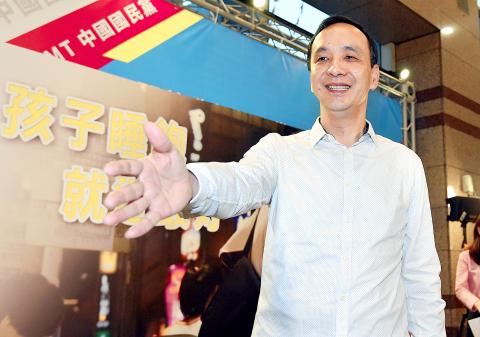Chinese Nationalist Party (KMT) Chairman Eric Chu’s (朱立倫) justification for replacing Deputy Legislative Speaker Hung Hsiu-chu (洪秀柱) as the party’s presidential candidate does not seem to hold water, as he appears to be even more unpopular than Hung among pan-blue supporters, a survey released yesterday showed.
The poll, conducted by Taiwan Indicators Survey Research on Monday and Tuesday, showed that nearly 57 percent of respondents feel unfavorably toward Chu, with only 24 percent saying they had a good impression of the KMT chairman.
That compares with a similar poll carried out by the research group last month — when Hung was still the KMT’s candidate — with 52 percent of respondents expressing their disfavor of the deputy legislative speaker, while 30 percent supported her.

Photo: Liao Chen-huei, Taipei Times
Chu, who has been hailed by most KMT members as the party’s only hope of continuing its reign, also received a higher disapproval rating of 22.1 percent among respondents identified as pan-blue than Hung, who garnered 17.3 percent in last month’s survey.
The results indicate that the aftermath of the KMT’s controversial move on Oct. 17 to force Hung out of the Jan. 16 presidential race and nominate Chu instead continues to take a toll on the chairman’s election prospects, the survey center said.
The results also undercut the KMT’s rationale behind removing Hung, which cited her consistently lackluster support ratings, which the party said could jeopardize its legislative majority, as well as her pro-unification policies, which it said strayed from the party’s cross-strait stance.
Asked who they plan to vote for in the presidential election, 47.1 percent of respondents said they would support Democratic Progressive Party (DPP) presidential candidate Tsai Ing-wen (蔡英文), 16.4 percent said they favored Chu and 10.2 percent preferred People First Party (PFP) challenger James Soong (宋楚瑜). Thirteen percent said they would abstain from voting, while 13.4 percent declined to express an opinion.
It is worth noting that Chu’s support rating was close to that of Hung — at 15.6 percent in a survey released on Oct. 15 — before she was edged out by her own party.
As for their perception about major political parties in Taiwan and China, 42 percent of those polled had a good opinion of the DPP, compared with 21.6 percent for the KMT and 13.7 percent for the Chinese Communist Party.
The poll collected 1,004 valid samples from residents aged 20 or above across the nation. It has a confidence level of 95 percent and a margin of error of 3.1 percentage points.

Tropical Storm Gaemi strengthened into a typhoon at 2pm yesterday, and could make landfall in Yilan County tomorrow, the Central Weather Administration (CWA) said yesterday. The agency was scheduled to issue a sea warning at 11:30pm yesterday, and could issue a land warning later today. Gaemi was moving north-northwest at 4kph, carrying maximum sustained winds near its center of up to 118.8kph and gusts of 154.8kph. The circumference is forecast to reach eastern Taiwan tomorrow morning, with the center making landfall in Yilan County later that night before departing from the north coast, CWA weather forecaster Kuan Shin-ping (官欣平) said yesterday. Uncertainty remains and

SEA WARNING LIKELY: The storm, named Gaemi, could become a moderate typhoon on Wednesday or Thursday, with the Taipei City Government preparing for flooding A tropical depression east of the Philippines developed into a tropical storm named Gaemi at 2pm yesterday, and was moving toward eastern Taiwan, the Central Weather Administration (CWA) said. Gaemi could begin to affect Taiwan proper on Tuesday, lasting until Friday, and could develop into a moderate typhoon on Wednesday or Thursday, it said. A sea warning for Gaemi could be issued as early as Tuesday morning, it added. Gaemi, the third tropical storm in the Pacific Ocean this typhoon season, is projected to begin moving northwest today, and be closest to Taiwan on Wednesday or Thursday, the agency said. Today, there would likely

DISRUPTIONS: The high-speed rail is to operate as normal, while several airlines either canceled flights or announced early departures or late arrivals Schools and offices in 15 cities and counties are to be closed today due to Typhoon Gaemi, local governments announced last night. The 15 are: Taipei, New Taipei City, Taoyuan, Tainan, Keelung, Hsinchu and Kaohsiung, as well as Yilan, Hualien, Hsinchu, Miaoli, Chiayi, Pingtung, Penghu and Lienchiang counties. People should brace for torrential rainfall brought by the storm, with its center forecast to make landfall on the east coast between tonight and tomorrow morning, the Central Weather Administration (CWA) said. The agency issued a sea warning for the typhoon at 11:30pm on Monday, followed by a land warning at 11:30am yesterday. As of

CASUALTY: A 70-year-old woman was killed by a falling tree in Kaohsiung as the premier warned all government agencies to remain on high alert for the next 24 hours Schools and offices nationwide are to be closed for a second day today as Typhoon Gaemi crosses over the nation, bringing torrential rain and whipping winds. Gaemi was forecast to make landfall late last night. From Tuesday night, its outer band brought substantial rainfall and strong winds to the nation. As of 6:15pm last night, the typhoon’s center was 20km southeast of Hualien County, Central Weather Administration (CWA) data showed. It was moving at 19kph and had a radius of 250km. As of 3pm yesterday, one woman had died, while 58 people were injured, the Central Emergency Operation Center said. The 70-year-old